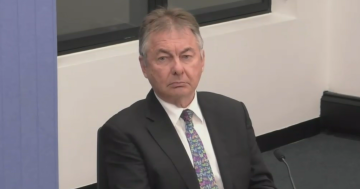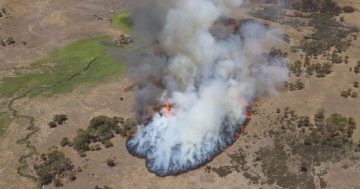
David McBride pleaded guilty days before his trial was to start. Photo: Albert McKnight.
Some of the information lawyers for whistleblower David McBride tried to obtain before he pleaded guilty referred to the hunt for a former Afghan soldier accused of murdering three Australians.
Details in McBride’s case were made public late on Thursday (7 December) when the ACT Supreme Court released its reasons for a pre-trial decision.
Justice David Mossop had upheld the Commonwealth Government’s claims that a public interest immunity applied to information in several documents, with his decision preventing McBride’s lawyers from accessing that information.
The issue was mostly argued in closed court, but the judge did ultimately release some details about the debate, even though his own reasons were heavily redacted.
He said the main document McBride allegedly illegally provided to media was a submission he made to the Inspector-General of the Australian Defence Force (IGADF).
Dated 15 August 2014, it was titled ‘Detailed Information Relating to the Allegations of Illegal Investigations of Special Operations Task Group in 2013’ and ran for 101 pages.
Justice Mossop said the apparent purpose of the submission was to prevent further investigation of the conduct of Australian soldiers in Afghanistan.
“The basic contention was that criminal investigations should not have been commenced in relation to five incidents that occurred in Afghanistan between October 2010 and September 2013 because there was not ‘reasonable suspicion’ necessary to commence such an investigation,” he said.
“It is not necessary for present purposes to describe the incidents or arguments in detail, however, the tone of the document is indicated by two of its early headings, ‘The Gradual Growth of Bias Against SOTG by HQJOC Legal’ and ‘The Commencement of Illegal/Vexatious Investigations’.”
He said McBride was a military lawyer who held the rank of major in the Australian Army and provided a copy of this submission to three different journalists.
“In two cases, the IGADF submission was provided along with two folders of documents which had accompanied the submission,” he said.
“In the third case, in addition to the two folders, there were some further documents provided.”
When police raided his home, they found eight plastic tubs of documents. There were about 400 documents, which ran for thousands of pages.
When it came to the public interest immunity argument, some of the documents in dispute related to efforts to capture Sergeant Hekmatullah, an Afghan National Army soldier who allegedly murdered three Australian soldiers and wounded two more.
Justice Mossop said redactions were sought as “they would reveal the nature and extent of the Australian Government’s engagement [redacted] in the apprehension of Sergeant Hekmatullah”.
McBride’s lawyers also argued another document was important as it was made shortly after an incident from on 28 April 2013 that is referred to in his IGADF submission.
“The incident is described in the complaint as ‘the incident where the dead insurgent’s hands were removed in order to identify whether any one of them were a key bomb-maker who had likely caused or contributed to the deaths of a number of Australian soldiers’,” Justice Mossop said.
When it came to another document with a SECRET marking, the Office of National Intelligence’s assistant director-general Susan Littlehales wanted redactions so as to not disclose the identity of a foreign intelligence partner or the content of the message.
“Australia is subject to a treaty obligation with the government of that country obliging it to protect from use classified material originating from that government without prior written approval,” Justice Mossop said.
McBride’s lawyers had argued that their client’s belief or justification for his belief when providing the documents would be a significant issue for a jury.
“It appears to be that the accused would contend that there was a reasonable doubt of his recklessness as to breach of his duty because he may have believed it was his duty to leak material to the journalists in order to disclose wrongful conduct on the part of military authorities who were investigating the incidents as possible murders when the accused contended that they should not have been,” the judge said.
McBride originally fought the allegations against him and the argument over the public interest immunity documents took place in the lead-up to his trial.
Days before the trial was to start, he pleaded guilty to three charges.
His sentence hearing has been set for March 2024.
Original Article published by Albert McKnight on Riotact.








